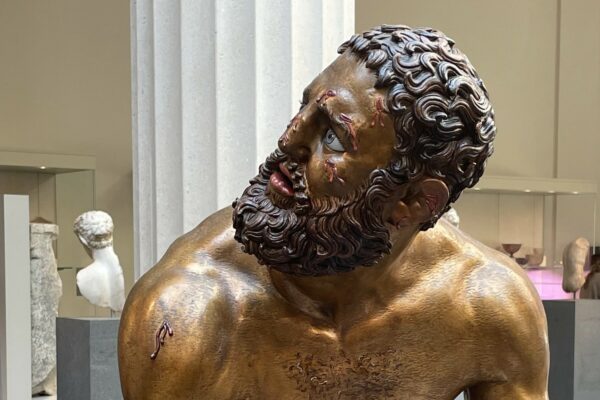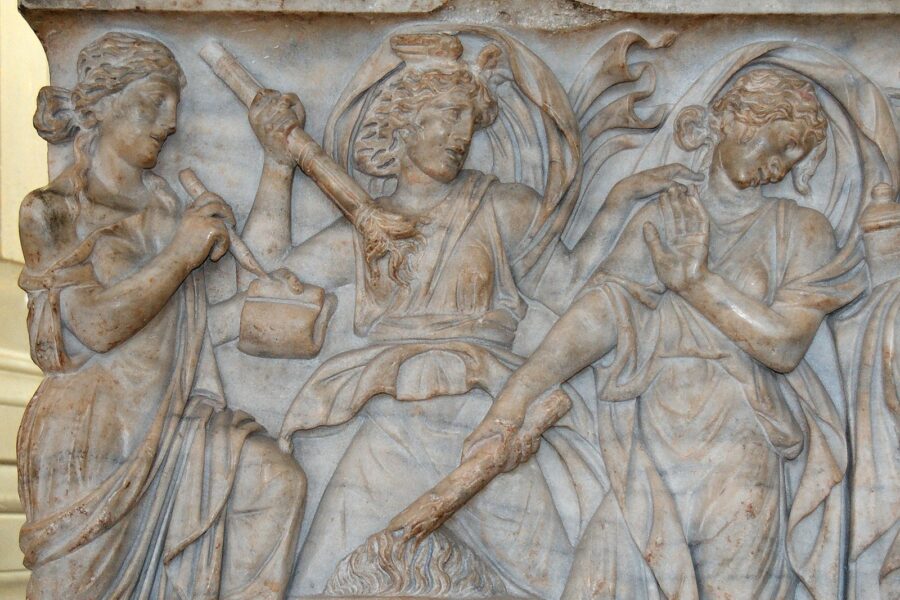
Destiny's Child, the ancient years.
Meeting 3: In which everyone makes hasty decisions about a pig and a log, and somehow everyone ends up dead.
This episode of Mythology Pitch Meetings brought to you by CLAS-C 205 Classical Mythology.
Have you ever wondered how your favorite Classical Myths came to be? This is absolutely not how that happened, but it could have happened, maybe, and that’s the point of mythology. Shout-out to Ryan George, whose Pitch Meeting video series inspired the Muses.
CALLIOPE, MUSE OF EPIC POETRY: So you have a Classical Myth to pitch to me?
HOMER, UNCONTESTED G.O.A.T OF ANCIENT POETRY: Do I! This one is about a prince named Meleager.
CALLIOPE: What’s his deal?
HOMER: Well, when he is born, the Fates appear to his mother Althea, and tell her that there is a mystical bond between her son’s soul and one of the logs burning in the fireplace. And if the log burns up, her son will die!
CALLIOPE: Wait, his soul is mystically connected to a log? What’s the logic there?
HOMER: None whatsoever.
CALLIOPE: Is it symbolic?
HOMER: Not to my knowledge.
CALLIOPE: Is that a thing the Fates do, connect souls to random objects in the room?
HOMER: No, it will never happen again. I guess the Fates are just shooting from the hip on this one. Maybe they’re bored? Spin, measure, cut, repeat a billion times—it’s not much of an eternity, when you think of it. So anyway, Althea immediately jumps up and grabs the log from the fire and locks it away in a trunk for safekeeping.
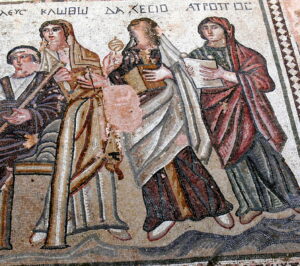
Atropos (in red) eventually got bored enough to always bring some light reading to a birth.
CALLIOPE: She keeps a log she desperately doesn’t want to burn in a wooden box?
HOMER: “Thinking things through” is not going to be Althea’s strongpoint. So Meleager grows up, and eventually he gathers a whole group of heroes to go kill the Calydonian Boar, which has been rampaging the neighborhood.
CALLIOPE: Boar, as in wild pig? Why would they need a whole bunch of heroes to capture a pig?
CLIO, MUSE OF HISTORY (interrupting): Have you seen a wild boar? They’re one of the nastiest animals in the Mediterranean. They’re nearly blind, so they get surprised easily, and when they do they rush their attacker, swinging razor-sharp tusks that happen to hit at the exact height of a grown man’s femoral artery. Most ancient hunters would rather take on a bear than a boar.
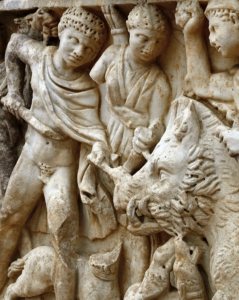
Babe’s ancestors were surprisingly hardcore.
CALLIOPE: I stand corrected, and also more educated regarding feral pigs. So do the heroes kill the pig?
HOMER: They do! Meleager strikes the killing blow, which means he gets to distribute the honorary spoils, which in this case is the boar hide. He gives it to Atalanta, this warrior princess who was the first one to wound the boar, so it makes sense she should get the honor.
CALLIOPE: He’s trying to get into her hunting outfit, isn’t he?
HOMER: Maybe. Anyway, his uncles go crazy, because they think they should get the boar hide instead of a woman.
CALLIOPE: Why? What did they contribute to the hunt?
HOMER: Nothing in particular, I just need them to move the plot forward. So there’s this big battle, and in the midst of the tussle Meleager kills both of his uncles.
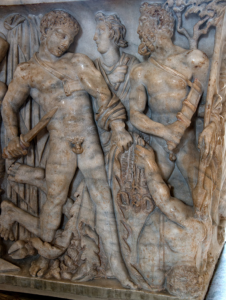
When carving the bottom corner of the sarcophagus, the artist suffered a head injury and abruptly entered his Picasso phase.
CALLIOPE: That escalated quickly. It’s going to be pretty hard for Althea to reconcile her love for her son with her love for her slain brothers.
HOMER: Nope, it’s going to be super easy, barely an inconvenience. As the hunting party is coming home, Althea hears from a messenger that her son killed both her brothers. So she grabs the magic soul-log and throws it on the fire!
CALLIOPE: Whoa, that escalated absurdly quickly! She’s willing to kill her own son just on the rumor that he killed her brothers?
HOMER: Apparently so. So as Meleager approaches the city, he gets weaker and weaker, as the log burns up, until he finally dies in his mother’s arms just as he reaches her. And then Althea realizes what she has done and is so distraught, she throws herself off a cliff!
CALLIOPE: She really is not into thinking things through calmly. What happens next?
HOMER: Nothing, that’s it. That’s the story.
CALLIOPE: Um, but what’s the myth’s point? Don’t burn a log if it’s connected to your son’s soul? Don’t let your sex-drive influence you when handing out pig skins?
HOMER: I think maybe just think before you do things? Honestly, I wasn’t looking for a moral here, things were just sort of happening as they came to me. Which is the opposite of the story’s moral, come to think of it.
CALLIOPE: Well, this myth sounds pretty stupid. But I think it can set up more myths about this Atalanta chick. She sounds really interesting.
HOMER: Full disclosure, her story is going to involve way more running-as-foreplay and lion-sex than you would anticipate.
CALLIOPE: What?
Share on Twitter, or Instagram, or really wherever you want.
For more exploits of the heroes of the Calydonian Boar Hunt, and how myths of heroes shaped Ancient Greek and modern societies, enroll in CLAS-C 205 Classical Mythology, coming up in Fall 2023, and earn GEC credits while you’re at it! Can’t get enough of Ancient Greece and Rome? Earn a Classics Minor in just 15 credits!


